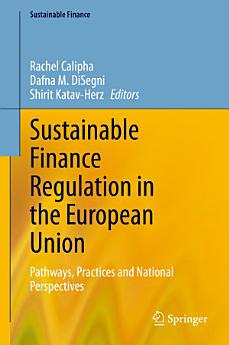Sustainable Finance Regulation in the European Union: Pathways, Practices and National Perspectives
About this ebook
The core of the book focuses on how six countries—Estonia, Spain, Germany, the Netherlands, Italy, and Israel—have adapted and implemented these regulations. It highlights the unique strategies and perspectives each country brings to the global sustainable finance landscape. The book concludes with a cross-country analysis, comparing the regulatory approaches and examining key dimensions like adoption, implementation, social inclusion, and enforcement challenges.
About the author
Rachel Calipha is a senior lecturer in Finance and Strategy at the Academic College of Tel Aviv-Yaffo, Israel, and a visiting professor at Yeshiva University in New York City, USA. She leads the Research Institute of Society and Economics (RISE) Impact and teaches advanced finance courses such as Investment Analysis and Portfolio Management, as well as sustainability-focused topics like Social Impact Bonds. A former team member of the European-funded Erasmus+ project on ‘Innovative Finance Inclusion,’ Rachel has authored numerous papers, books, chapters, and case studies. Her sustainability research is featured in the books Performance Challenges in Organizational Sustainability and the Encyclopedia of Finance.
Dafna M. DiSegni is currently a Visiting Professor at the University of Rhode Island (USA) and formerly an Associate Professor of Economics at Tel-Hai College. She holds a PhD in Applied Economics from the University of California (USA). Specializing in Natural Resource Management, Industrial Organization, and Development, her expertise is integrated into sustainable finance and risk analysis. Dr. DiSegni also extends her proficiency to environmental and resource economic valuation and natural resources analysis. She has published over 30 scientific manuscripts focused on enhancing market sustainability and efficiency. She is a member of the Diversity, Equity, and Inclusion (DEI) Board of the European Association of Environmental and Resource Economists and a former team member of the European Erasmus+ funded project on ‘Innovative Finance Inclusion,’ contributing significantly to policy design and implementation in sustainable finance, particularly in developing countries.
Shirit Katav-Herz is a senior lecturer of Economics in the School of Management and Economics at the Academic College of Tel Aviv-Yaffo, Israel, where she heads the Undergraduate Program of Economics and Management (B.A.). She earned her Ph.D. from Bar-Ilan University, Israel. Her current research focuses on impact investments, the social effects of inequality on economic decision-making concerning risk aversion, and the effect of social norms on household decision-making, particularly regarding child labor. She is a member of the International Association for Research in Economic Psychology (IAREP) and the Global Labor Organization (GLO), as well as a former team member of the European Erasmus+ funded project on ‘Innovative Finance Inclusion.’




